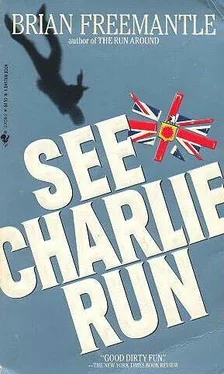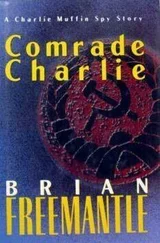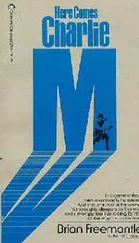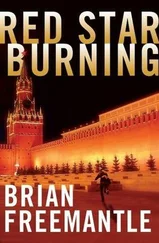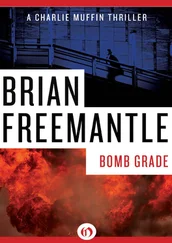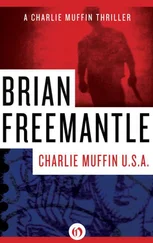Brian Freemantle - See Charlie Run
Здесь есть возможность читать онлайн «Brian Freemantle - See Charlie Run» весь текст электронной книги совершенно бесплатно (целиком полную версию без сокращений). В некоторых случаях можно слушать аудио, скачать через торрент в формате fb2 и присутствует краткое содержание. Жанр: Шпионский детектив, на английском языке. Описание произведения, (предисловие) а так же отзывы посетителей доступны на портале библиотеки ЛибКат.
- Название:See Charlie Run
- Автор:
- Жанр:
- Год:неизвестен
- ISBN:нет данных
- Рейтинг книги:4 / 5. Голосов: 1
-
Избранное:Добавить в избранное
- Отзывы:
-
Ваша оценка:
- 80
- 1
- 2
- 3
- 4
- 5
See Charlie Run: краткое содержание, описание и аннотация
Предлагаем к чтению аннотацию, описание, краткое содержание или предисловие (зависит от того, что написал сам автор книги «See Charlie Run»). Если вы не нашли необходимую информацию о книге — напишите в комментариях, мы постараемся отыскать её.
See Charlie Run — читать онлайн бесплатно полную книгу (весь текст) целиком
Ниже представлен текст книги, разбитый по страницам. Система сохранения места последней прочитанной страницы, позволяет с удобством читать онлайн бесплатно книгу «See Charlie Run», без необходимости каждый раз заново искать на чём Вы остановились. Поставьте закладку, и сможете в любой момент перейти на страницу, на которой закончили чтение.
Интервал:
Закладка:
The Special Forces colonel, more experienced in the way of buck-passing and report filing than the CIA fieldman, said: ‘Wait a while, buddy. See how the whole thing shakes down before you start throwing garbage into the wind.’
At that moment Yuri Kozlov entered the enormous lobby of the Imperial Hotel, no longer concerned about security — no longer concerned about anything — and walked up to Fredericks, who was waiting for him at the steps leading into the sunken lounge.
‘Thank you for being here,’ said Kozlov.
‘I’m glad you finally made it,’ said Fredericks.
Fredericks didn’t give a shit if the Russkie or any of the CIA guys watching were aware of how relieved he was. He’d just saved his ass.
Chapter Thirty
The airport arrival in London went as smoothly as the departure from Tokyo. The aircraft went to the private, northern section of Heathrow, where the transportation was ready: a helicopter for Olga — and female as well as male escorts — to fly her undetected by any doubtful Soviet interception to the safe debriefing house in Surrey. And a surprising limousine for Charlie, with the sealed instruction carried by the security-cleared driver to go directly to Sir Alistair Wilson’s house in Hampshire.
‘It’s Sunday,’ reminded the driver.
Charlie lounged in the back of the vehicle, savouring the unaccustomed luxury. There was even a cocktail cabinet recessed into the seat in front, and Charlie pulled the flap down and saw that the cut glass bottles were full.
‘Help yourself,’ invited the driver. ‘Comes off the Ministry of Works budget.’
‘It’s been a long flight and it’s early,’ refused Charlie. Guessing the reason behind the invitation, he added: ‘Bottles don’t look full to me,’ and the driver smiled appreciately at him through the rear view mirror.
It had been a long flight, and Charlie felt buggered. There hadn’t been any proper washing facilities on the transport plane — the lavatory had been a hear-the-splash affair behind a canvas screen — and he felt sticky and knew he was stubble-chinned: he wondered if there were any grey in the growth. He was aware the suit looked even more than usual as if he had slept in it, which on this occasion he had but not well, because the webbing seats he’d assured that cheery major would be fine had turned out to be damned uncomfortable: para-troopers weren’t brave, just smart enough to know how to get out of the bloody things as quickly as possible.
A posh car with a driver in a uniform and a cubby-hole full of booze was a definite improvement. And indicative, If he were still in the shit he wouldn’t be getting the welcome-home little hero treatment: well, maybe hero was a bit strong, but the rest was near enough. On a scale of ten, he was shooting at least eight. Charlie glanced again at the drinks cupboard, reconsidering a celebration. Better not: always the chance of the unexpected steel-shod boot, and there had been too many of those in the past few days.
The driver turned off at a Micheldever sign and looped through lanes that hadn’t been built for cars this size and certainly not at this speed, and Charlie hoped the driver didn’t go at the cocktail cabinet too hard before the journey back. He was grateful when they swept into an unmarked drive, past gate pillars surprisingly with no gate and a gatehouse even more surprisingly with no attendant. Charlie’s uncase was just forming when they came to the security, sensibly placed halfway up the drive where it was not visible from the road. Hidden though it was, the cordon was still discreet, the replacement gatehouse looking like its predecessor but less lavish, a box-like guard house designed to look like a retraction forced upon a land-owner whose fortunes were diminishing. It was, in fact, perfect protection, pitched upon an obvious elevation with a soldier’s eye-view of any approach from the highway. The attendant was close cropped and upright and clearly ex-army, and because he was looking hard Charlie managed to identify the concealed antennae which would be linked to the electronic surveillance of the place. Absence of any high wall was understandable: ground sensors and infra-red television cameras were far more effective. The pass check was very thorough, and when they went through Charlie saw there was a second man in the tiny building.
Sir Alistair Wilson’s home was a square-built, weathered-red mansion with a parapet around the roof edge and matching, miniature parapets before all but the ground-floor facing windows. The front of the house was bearded with cut-close creeper, buried in which — because he was looking and recognized them — Charlie picked out three surveillance cameras but guessed there were more.
The house was not, however, the focal point of the approach. It was the rose beds, laid out with the squared and rectangular perfection of the attack formations of Wellington’s red-coated armies and with the same regimentation of colours, beyond the reds to oranges and pinks and whites and yellows and crimsons and peach. Everywhere was dominated by the varying smells when Charlie was let out of the car: the driver called him sir and Charlie decided it was becoming a habit.
A man with another soldier’s haircut opened the door, but the Director was already clumping across the black and white tiled entry hall, hand outstretched in greeting: ‘Charlie! Well done, Charlie! Good to see you back in one piece.’
‘There were times when I didn’t think I would be,’ said Charlie. He rubbed his chin and look down at himself: ‘Afraid I didn’t have time to …’
‘Didn’t expect you to,’ said Wilson, dismissively. He said — an order, not an invitation — “You’ll stay for lunch” and then, ‘Before drinks let’s walk in the garden,’ and set off despite the stiff leg at a pace Charlie had trouble matching. The Director led through a leather-furnished library, out of french windows and directly on to the rear of the house. There were even more rose beds in military formations, and Charlie thought an army to the back and an army to the front. At the rear, ramblers replaced the creeper of the approach and the cameras here were placed again to be scarcely visible: if he hadn’t been looking, he wouldn’t have seen them.
Wilson jerked his hand towards a pink species and said: ‘Displayed at Chelsea this year: got a commended.’
Charlie was unsure what was expected, so he said: ‘Well done.’
‘Do better next year,’ said the Director. ‘Irena’s singing her head off, incidently; can’t stop talking.’
‘Olga won’t,’ said Charlie, positively. ‘There’s still a lot of remorse at the killing — shock, I suppose — but eventually she’s going fully to realize what she’s done by coming across. She’s not a defector, not like they normally are.’
Wilson pulled a branch of something yellow towards him and said: ‘Smell that: isn’t it wonderful? She’s here though, isn’t she? She’ll have to cooperate, finally.’
‘I suppose so,’ said Charlie. He seemed to remember apologizing before but decided a repetition wouldn’t hurt. ‘Sorry for any upsets.’
‘All forgotten,’ said Wilson, breezily. ‘Even got a congratulation at a session of the Intelligence Committee. Our estimation of Soviet technology espionage was about eighty per cent too low: Irena’s giving us names, dates, places … and everything about what her husband did. Names, dates, places, as well. She’s very bitter.’
‘Got a bloody good reason to be.’
‘She’s asked about you, incidently.’
‘Asked what?’
‘Seemed to think you would be her debriefing officer.’
‘What was she told?’
‘Nothing positive: we’ll have to put you in, of course, if we think there’s something she’s holding back, for you.’
Читать дальшеИнтервал:
Закладка:
Похожие книги на «See Charlie Run»
Представляем Вашему вниманию похожие книги на «See Charlie Run» списком для выбора. Мы отобрали схожую по названию и смыслу литературу в надежде предоставить читателям больше вариантов отыскать новые, интересные, ещё непрочитанные произведения.
Обсуждение, отзывы о книге «See Charlie Run» и просто собственные мнения читателей. Оставьте ваши комментарии, напишите, что Вы думаете о произведении, его смысле или главных героях. Укажите что конкретно понравилось, а что нет, и почему Вы так считаете.
